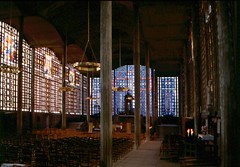
Chapel interior
Originally uploaded by andrewpaulcarr.
It is unfortunate that the traditional Latin liturgy has been taken as a rallying point for ignorance and reaction. An article by Moyra Doorly in the journal of the Latin Mass Society addresses a widespread concern when she remarks upon the failure of recent church architecture to establish a sense of transcendence. But she goes on to attribute this failure to the Modern Movement, which is unjustified. The history of twentieth century architecture does not warrant such a conclusion. (Article by Moyra Doorly in Mass of Ages)
During the closing years of the nineteenth century and the first decades of the twentieth, new conceptual tools were becoming available to architects and designers through the proliferation of descriptive systems. These led to advances in understanding of all aspects of the built environment and product design – materials science, civil engineering, project management, acoustics, heating, lighting, ventilation, biometrics and ergonomics, and hygiene.
As these new techniques and insights were assimilated into the design process, it was inevitable that architects would reflect upon how they thought about and practised their profession. A vigorous discourse developed amongst theorists and practitioners in architecture and design. A multiplicity of stances, often contradictory, were taken up. The diverse trends of that period are commonly referred to as “Modernist” but it is a label with no actuality outside of the writers’ intentions.
Like the Amish, one can choose not to live in the present, but this has never been part of the tradition of the Latin rite church, which recognises that the incarnational world is one of change. Far from being responsible for the denial of transcendence, the additional conceptual tools at the disposal of architects from the start of the twentieth century have made it possible to create spaces better suited than any before for the celebration of the traditional Catholic liturgy; consider, for example, the buildings of architects such as Auguste Perret and Antoni Gaudi, the latter anticipating the works of contemporary designers, and who were as much involved in early twentieth-century discourse as the Vienna Secessionists and the Bauhaus school.
Much recent church architecture - and liturgical practice too - is indeed a denial of transcendence, but it spoils a good case to lay the blame on Modernism. Twentieth century architectural theory and practice should not be held responsible. The reasons lie elsewhere.
Kommentarer